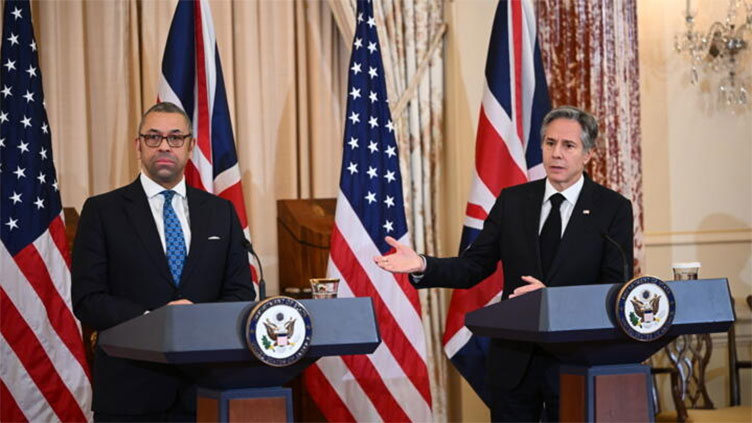UK sees 'moral imperative' of Ukraine tanks as US teases new aid

World
Britain said that its decision to provide tanks to Ukraine to fight Russia was a "moral imperative."
WASHINGTON (AFP) – Britain said Tuesday that its breakthrough decision to provide tanks to Ukraine to fight Russia was a "moral imperative," as the United States said that more military aid was coming.
Foreign Secretary James Cleverly on a visit to Washington said that Britain was sending a signal to Russian President Vladimir Putin by backing the Ukrainians and becoming the first nation to agree to their request for Western tanks.
"What Putin should understand is we are going to have the strategic endurance to stick with them until the job is done. And the best thing that he can do to preserve the lives of his own troops is to recognize that we re going to stick with Ukrainians until they are victorious," he said at the Center for Strategic and International Studies.
"It all costs so much more in human lives and so much more in money if we allow this to be a long, drawn-out attritional war," he said.
"There are body bags coming back from the front from Russia as well as Ukrainians. So the moral imperative is to bring this to a conclusion."
Prime Minister Rishi Sunak announced Saturday that his government would provide 14 Challenger 2 tanks, leading Russia to charge that Britain was worsening the conflict.
After meeting Cleverly, US Secretary of State Antony Blinken said that "we applaud" the tank decision.
He stopped short of saying the United States would send tanks as well but noted that Defense Secretary Lloyd Austin will meet later this week with US allies on Ukraine.
"I would anticipate that you ll hear more announcements in the days to come," Blinken told a joint news conference.
"We have continuously provided what Ukraine needs and we re doing it in a way to make sure that it s responsive to what s actually happening on the battlefield," Blinken said.
European countries have previously supplied Kyiv with modernized versions of Soviet tanks and the United States and France have committed to lighter versions, with Washington sending Bradley armored vehicles.
Germany has faced calls from other Europeans to do more, with Chancellor Olaf Scholz set to decide whether to approve Leopard tanks for Ukraine.
Scholz has committed to a major upgrade of the German military, moving away from his country s previous hesitation linked to the war legacy and efforts to engage Russia.
Asked about Leopard debate, Blinken said that military shipments were "sovereign decisions for each country to make" but called Germany s efforts "quite extraordinary," hailing Berlin for recently joining the United States in giving Ukraine a Patriot missile defense system.
Cleverly said that Britain decided to send tanks to the Ukrainians because "what we recognize they need is the ability to push back hard in the east and in the south," areas which Russia has tried to seize since its invasion launched nearly 11 months ago.
"If Putin believed that the world would succumb to Ukraine fatigue and lose the will to resist his ambitions, then that was once again another colossal misjudgment on his part," Cleverly said.
President Joe Biden has held firm against sending long-range missiles to Ukraine, fearing that a strike deep inside Russia could trigger direct conflict between Washington and Moscow.

